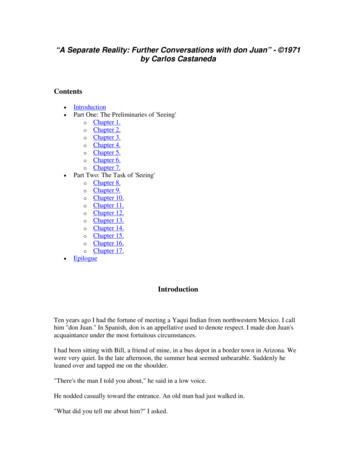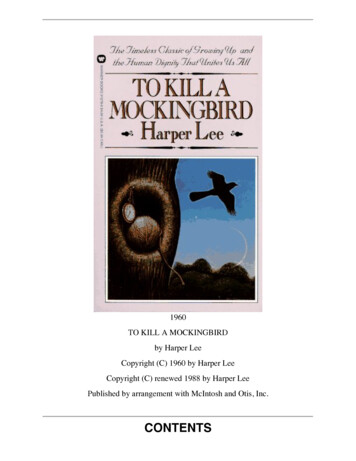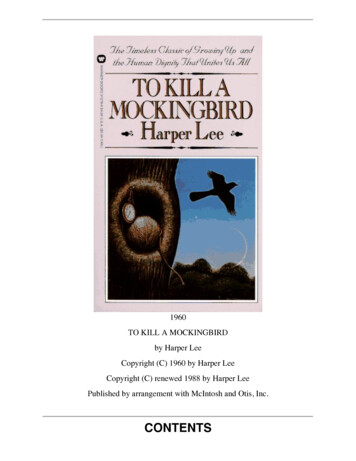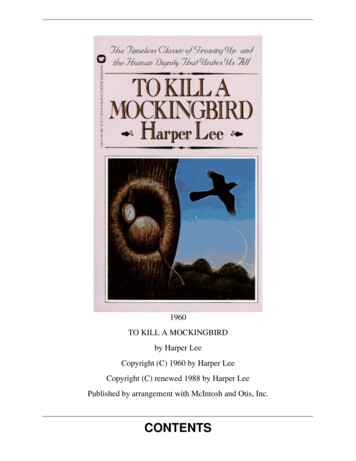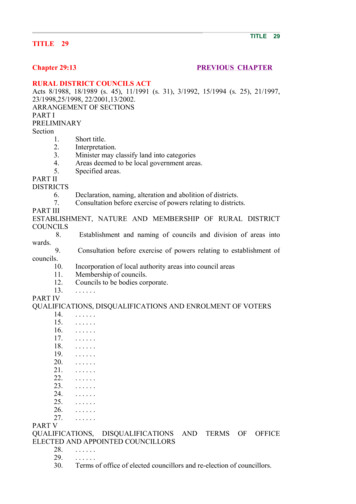
Transcription
TITLETITLE2929Chapter 29:13PREVIOUS CHAPTERRURAL DISTRICT COUNCILS ACTActs 8/1988, 18/1989 (s. 45), 11/1991 (s. 31), 3/1992, 15/1994 (s. 25), 21/1997,23/1998,25/1998, 22/2001,13/2002.ARRANGEMENT OF SECTIONSPART IPRELIMINARYSection1.Short title.2.Interpretation.3.Minister may classify land into categories4.Areas deemed to be local government areas.5.Specified areas.PART IIDISTRICTS6.Declaration, naming, alteration and abolition of districts.7.Consultation before exercise of powers relating to districts.PART IIIESTABLISHMENT, NATURE AND MEMBERSHIP OF RURAL DISTRICTCOUNCILS8.Establishment and naming of councils and division of areas intowards.9.Consultation before exercise of powers relating to establishment ofcouncils.10.Incorporation of local authority areas into council areas11.Membership of councils.12.Councils to be bodies corporate.13.PART IVQUALIFICATIONS, DISQUALIFICATIONS AND ENROLMENT OF RT VQUALIFICATIONS, DISQUALIFICATIONS AND TERMS OF OFFICEELECTED AND APPOINTED COUNCILLORS28.29.30.Terms of office of elected councillors and re-election of councillors.
31.Appointed councillors.32.Casual vacancies.PART VIELECTIONS AND ELECTION PROCEDURE33.34.35.36.37.38.39.40.41.42.43.44.PART VIIPROCEEDINGS OF RURAL DISTRICT COUNCILS45.Chairman and vice-chairman.46.Meetings and special meetings of councils.47.Quorum at meetings.48.Disability from voting on account of interest in contracts, etc.49.Validity of proceedings of councils.50.Meetings open to public.51.Minutes of proceedings.52.Rescission or alteration of resolutions.53.Minister’s approval required for certain resolutions.54.Maximum period of leave of absence of councillors.PART VIIICOMMITTEES OF RURAL DISTRICT COUNCILS55.Finance committee.56.Area committees.57.Town boards.58.Roads committee.59.Ward development committees.60.Rural district development committee.61.Environment committee and subcommittee.62.Other committees of council.63.General provisions applicable to all committees.64.Subcommittees.PART IXSTAFF OF RURAL DISTRICT COUNCILS65.Interpretation in Part IX.66.Appointment of officers and employees of councils.67.Conditions of service of officers and employees of councils.68.Delegation of powers to appoint and dismiss employees of councils.69.Delegation of powers of councils to officers and employees.70.Corrupt practices by officers and employees of councils.PART XPOWERS OF DUTIES OF RURAL DISTRICT COUNCILS71.Powers of councils generally.72.Powers in regard to sewerage and drainage.73.Enforcement of conditions of title.74.Development functions of councils.75.Owners and occupiers of land may be charged for services made
available.76.Charges, rents and deposits by resolution.77.Powers of entry and inspection.78.Compulsory acquisition of property.79.Contracts and tenders of councils.80.Income-generating projects.81.Establishment of co-operatives.82.Co-operation with local authorities and persons.83.Joint committees: by agreement.84.Joint committees: Minister’s authority.85.Provisions as to members and proceedings of joint committees.86.Estate development.87.Minister’s power to act on behalf of councils re state development.PART XIBY-LAWS OF RURAL DISTRICT COUNCILS88.Making of by-laws.89.By-laws in relation to certain urban areas.90.Minister’s approval of by-laws.91.Model by-laws.92.Effect of repeal or amendment of model by-laws.93.Model building by-laws.94.Minister’s power to make or adopt by-laws on behalf of councils.PART XIILEVIES AND OTHER CHARGES95.Interpretation in Part XII.96.Levies in rural areas.97.Special levies in rural areas.98.Urban land which is rateable property.99.Rates in respect of rateable property.100. Special rates in respect of rateable property.101. Application of provisions of Cap. 29:15 relating to valuation andrating.102. Land development levies on urban land.103. Notice of intention to impose special levy or special rate.104. Notice of liability to pay charges.105. Imposition of and accounting for levies, rates and special rates.106. When persons liable to pay portion only of charge.107. Abatements for prompt payment of charges.108. Interest on unpaid charges.109. Charges to be paid before transfer of land.110. Occupiers and agents liable for levies and rates in default of owners.111. Collection of charges and payment by instalments.112. Payment of charges by persons who first become liable thereto afterfixed date.113. Councils may require persons liable to pay levy to submit returns.114. Refusal by occupiers to disclose names and addresses of owners ofpersons receiving rent.115. Taxpayers leaving Zimbabwe.116. Sales and leases of land and cancellations thereof to be reported tocouncils.PART XIIIFINANCIAL PROVISIONS117. Interpretation in Part XIII.118. Funds of councils.119. Financial year.
120. Books and accounts.121. Estimates.122. Elimination or reduction of accumulated deficit.123. Banking accounts.124. Borrowing powers.125. Bank overdrafts.126. Security for loans.127. Repayment of loans.128. Capital development funds.129. Revenue reserves.130. Housing account.131. Investment of moneys.132. Guarantees of loans to officers and employees.133. Writing off of bad debts.134. Appointment of auditors.135. Duties of councils re audit.136. Powers and report of auditor.137. Duty of council re accounts and report of auditor.138. Power of Minister to conduct financial inquiry.PART XIVALTERATION AND ABOLITION OF RURAL DISTRICT COUNCILS139. Alteration of councils and wards and abolition of councils.140.Consultation before exercise of powers relating to alteration orabolition of councils or wards.141. Continuation in office of councillors representing altered wards.142. Incorporation of local authority areas into altered council areas.143. Powers exercisable on abolition of councils.PART XVGENERAL144. Exemption of councils, councillors, officers, employees and otherpersons from liability.145. Designated officers.146. Appointment of public servants to be subject to laws relating to PublicService.147. Copy of Act, regulations and by-laws to be available for inspection.148. Effect of invalidity of elections on civil proceedings.149. Execution and authentication of documents.150. Vesting of property in councils.151. Recovery of unpaid levies, rates, rents and charges.152. Books and records to be prima facie evidence.153. Minister to be furnished with reports.154. Investigations by Minister.155. Minister may direct certain actions.156. Minister may rectify omitted acts.157. Suspension and dismissal of councillors.158. Minister may appoint commissioner to act as council.159. Regulations.160. Obstruction and impersonation.161. Refusal to obey orders, requirements or directions of Minister.162. Conviction no bar to further proceedings.163. Compensation for loss caused through offences.164. Transitional provisions and savings.165. Construction of references in enactments.FIRST SCHEDULE: Powers of Rural District Councils.SECOND SCHEDULE: Matters for which Rural District Councils
may make by-laws.THIRD SCHEDULE: Scales of Development Levies and SpecialDevelopment Levies.AN ACT to provide for the declaration of districts and the establishment of ruraldistrict councils; to confer and impose functions upon rural district councils andprovide for the administration of their areas; and to provide for matters connectedwith or incidental to the foregoing.[Date of commencement: 19th August, 1988.]PART IPRELIMINARY1Short titleThis Act may be cited as the Rural District Councils Act [Chapter 29:13].2Interpretation(1) In this Act—“appointed councillor” means a person appointed to be a councillor in terms ofsection thirty-one or forty one;“area committee” means an area committee appointed in terms of section fifty-six;“auditor” means a person appointed as auditor in terms of subsection (1) or (2) ofsection one hundred and thirty-four;“building society” means a building society registered in terms of the BuildingSocieties Act [Chapter 24:02];“casual vacancy" means a vacancy in the membership of a council referred to insubsection (1) of section thirty-two;“chairman”, in relation to a council, means the chairman of the council elected orappointed in terms of section forty-five;“charge” means, subject to section ninety-five, any fee or charge leviable by orpayable to a council in terms of this Act;“chief executive officer”, in relation to a council, means the chief executive officer ofthe council appointed in terms of section sixty-six;“commercial bank” means a commercial bank registered in terms of the Banking Act[Chapter 24:01];“commercial ward” means a large-scale commercial ward or a small-scalecommercial ward;“committee” means a committee appointed or established in terms of Part VIII;“Communal Land” means—(a)any land that is Communal Land in terms of the Communal Land Act[Chapter 20:04]; and(b)any other land that was within the area of a district council on the 19thAugust, 1988;“communal ward” means a ward consisting wholly or mainly of Communal Land;“co-operative” means(a)a co-operative company registered in terms of the Companies Act[Chapter 24:03]; or(b)a co-operative society registered in terms of the Co-operativeSocieties Act [Chapter 24:05], or(c)any other association of persons which has as its object the promotionof the economic interests of its members in accordance with co-operative principles;“council” means a rural district council established in terms of this Act;“council area” means the area for which a council has been established;“councillor” means an appointed councillor or an elected councillor;“development levy” means a development levy imposed by a council in terms ofsubsection (2) of section ninety-six;“district” means an area declared to be a district in terms of section six;“district administrator”, in relation to a council or proposed council, means—(a)the district administrator within whose district the council area or
proposed council area lies; or(b)any person appointed by the district administrator referred to inparagraph (a) to exercise his functions in terms of this Act in relation to the council orproposed council;“elected councillor” means a person elected or re-elected as a councillor in terms ofPart VI;“environment committee” means an environment committee appointed in terms ofsubsection (2) of section sixty-one;[Inserted by Act 13 of 2002 with effect from the 17th March , 2003.]“environment subcommittee” means—(a)an environment subcommittee appointed in terms of subsection (6) ofsection sixty-one; or(b)a ward development committee or a village development committeedesignated as an environment subcommittee in terms of subsection (9) of sectionsixty-one;[Inserted by Act 13 of 2002 with effect from the 17th March , 2003.]“finance committee” means a finance committee appointed in terms of section fiftyfive;“intensive conservation area” has the meaning given to it in the Natural ResourcesAct [Chapter 20:13];“land category” means any of the following categories of land—(a)Communal Land;(b)large-scale commercial land;(c)resettlement land;(d)small-scale commercial land;(e)urban land;“land development levy” means a land development levy imposed by a council interms of subsection (1) of section ninety-six;“large-scale commercial land” means—(a)land which—(i)immediately before the date of commencement of this Act, wassituated within a rural council area; and(ii)is not Communal Land, resettlement land, small-scale commercialland or urban land;or(b)land which has been declared in terms of section three to be largescale commercial land;“large-scale commercial ward” means a ward consisting wholly or mainly of largescale commercial land;“levy” means a land development levy, a special land development levy, adevelopment levy or a special development levy;“local authority” means a municipal council, town council, local board, rural districtcouncil or provincial council and, for so long as any such councils remain inexistence, includes a rural council established under the Rural Councils Act [Chapter211 of 1974] and a district council established under the District Councils Act[Chapter 231 of 1974];“local government area” includes any area deemed to be a local government area byvirtue of a declaration in terms of section four;“Minister” means the Minister of Local Government, Rural and Urban Developmentor any other Minister to whom the President may from time to time assign theadministration of this Act;“natural resources conservation committee” . . . . [Repealed by Act 13 of 2002.]“natural resources conservation subcommittee” . . . . . .[Repealed by Act 13 of 2002.]
“neighbourhood development committee” means a neighbourhood developmentcommittee appointed or formed under regulations made in terms of section onehundred and fifty-nine;“province” means an area declared to be a province in terms of the ProvincialCouncils and Administration Act [Chapter 29:11];“rate” means a rate imposed by a council in terms of section ninety-nine;“Registrar-General” means the Registrar-General of Elections referred to in section15 of the Electoral Act [Chapter 2:01] or, in respect of any particular function vestedin the Registrar-General, any person to whom he may have delegated that function interms of subsection (3) of that section;“resettlement land” means—(a)land acquired or owned by the State for resettlement purposes; or(b)land that has been declared in terms of section three to be resettlementland;“resettlement ward” means a ward consisting wholly or mainly of resettlement land;“road” means any road, street, highway, thoroughfare, sanitary or other lane, cycletrack, footpath, pavement, alley, subway, passage, square, bridge or other place of alike nature or any portion thereof, and includes all appurtenances thereto;“roads committee” means a roads committee established in terms of section fiftyeight;“rural district development committee” means a rural district development committeeestablished in terms of section sixty;“small-scale commercial land” means—(a)land that was classified as purchase land on the 1st February, 1979; or(b)land that has been declared in terms of section three to be small-scalecommercial land;“small-scale commercial ward” means a ward consisting wholly or mainly of smallscale commercial land;“special development levy” means a special development levy imposed by a councilin terms of section ninety-seven;“special land development levy” means a special land development levy imposed by acouncil in terms of section ninety-seven;“special levy” mean a special land development levy or a special development levy;“special rate” means a special rate imposed by a council in terms of section onehundred;“specified area” means an area declared to be a specified area in terms of section five;“subcommittee” means a subcommittee appointed by a committee in terms of sectionsixty-four;“total membership”, in relation to a council, means the number of councillors which,in terms of this Act, constitutes the council;“town area” means four or more continuous urban wards;“town ward” means one of the four or more urban wards that constitute a town area;“urban land” means—(a)land containing stands or plots used or intended to be used forresidential, commercial or industrial purposes; or(b)land set aside in terms of section 10 of the Communal Land Act[Chapter 20:04], for the establishment of a township, village, business centre orindustrial area; or(c)land that has been declared in terms of section three to be urban land;“urban ward” means a ward consisting wholly or mainly of urban land;“vice-chairman”, in relation to a council, means the vice-chairman of the councilelected in terms of section forty-five;“village development committee” means a village development committee referred toin section 17 of the Traditional Leaders Act [Chapter 29:17], [Chapter 29:17];[amended by Act 13 of 2002 with effect from the 17th March , 2003.]
“voter” means a person who is entitled to vote and is on a voters’ roll for a ward of acouncil area;“ward” means a ward into which a council area is divided or re-divided in terms ofsection eight or one hundred and thirty-nine;“ward development committee” means a village development committee establishedin terms of section fifty-eight.(2) Where in this Act anything is required to be agreed or done by no fewer than twothirds or one-half or one-third or any other fraction of a total number of persons, andthe total number of persons is not an integral multiple of three or two or thedenominator of the other fraction, as the case may be, then the thing shall be dulyagreed or done if it is agreed or done by two-thirds or one-half or one-third or anyother fraction, as the case may be, of the number next above that of the total numberof persons which is an integral multiple of three or two or the denominator of theother fraction, as the case may be.(3) Where anything is required, in terms of this Act, to be lodged, posted, laid open ormade available for inspection or otherwise done at the offices of a council such thingshall be lodged, posted, laid open or made available for inspection, as the case maybe, at the office of the chief executive officer of the council or at such other office asthe chief executive officer may notify by notice in a newspaper.(4) Where in terms of this Act any notice is required to be given or published—(a)in a newspaper, such notice shall be given or published in a newspapercirculating in the council area or other area concerned;(b)in more than one issue of a newspaper, such notice shall be given orpublished in consecutive weekly issues of a newspaper circulating in the council areaor other area concerned.3Minister may classify land into categoriesAfter consultation with any council established for the area concerned, the Ministermay, subject to any other law, by notice in the Gazette, declare that any land shallbe—(a)large-scale commercial land; or(b)resettlement land; or(c)small-scale commercial land; or(d)urban land;for the purposes of this Act.4Areas deemed to be local government areasAfter consultation with the council concerned and, where appropriate, with theapproval of the Minister responsible for the administration of the other enactmentconcerned, the Minister may, by statutory instrument, declare that any area within acouncil area shall be deemed to be a local government area for the purposes of suchprovisions of this Act or any other enactment as are specified in the notice, and theprovisions so specified shall thereupon apply, mutatis mutandis, in relation to sucharea as though such area were a local government area administered by the council.5Specified areasAfter consultation with any council established for the area concerned, the Ministermay, by statutory instrument, declare that any urban land which—(a)is within a council area or proposed council area; and(b)in the opinion of the Minister, consists wholly or mainly of residentialaccommodation;shall be a specified area for the purposes of this Act.PART IIDISTRICTS6Declaration, naming, alteration and abolition of districtsSubject to section seven, the President may at any time, by statutory instrument—(a)declare any area within a province to be a district;(b)assign a name to any district;
(c)alter the boundaries or name of, or abolish, any district.7Consultation before exercise of powers relating to districts(1) Before the President exercises his powers in terms of section six, the Minister mayappoint a commission from the residents of the area concerned which shall makerecommendations to the Minister, within six months or such longer or shorter periodas the Minister may authorize or require, upon—(a)the proposed exercise of powers by the President; and(b)the matters referred to in subsection (1) of section nine where it isintended to establish a council for any proposed district and the Minister has requiredthe commission to make recommendations to him upon those matters.(2) If, before the President exercises his powers in terms of section six, the Ministerhas not appointed a commission in terms of subsection (1), the Minister shall takesuch steps as are reasonably necessary to give residents of the area concerned noticeof the proposal to exercise such powers, and, in addition, shall cause a notice to bepublished in at least three issues of a newspaper—(a)stating that it is proposed to recommend to the President that heshould exercise such powers and setting out the nature of the proposals and, inparticular, to the extent applicable—(i)the proposed boundaries of the district concerned;(ii)the proposed name of the district-concerned;(iii)where the proposals will affect the area of any council or any wardthereof—A.the proposals in relation to the wards and councillors involved;B.the proposed apportionment between any councils concerned of anyproperty, assets, rights and liabilities, including the payment of any moneys and theprotection of the rights of employees;C.the nature of any powers proposed to be exercised in terms ofsubsection (3) of section ten;and(b)calling upon any person who wishes to make representations inrelation to the proposals to lodge them with the Minister within the period stated inthe notice, which period shall be at least thirty days from the date of the lastpublication of the notice.(3) When any recommendation is submitted to the President concerning the exerciseof his powers in terms of section six, there shall be submitted to him, together withthe recommendation—(a)the report of the commission, if any, appointed in terms of subsection(1); or(b)the substance and number of the objections, if any, lodged with theMinister in response to a notice published in terms of subsection (2);as the case may be, together with any comments the Minister may wish to make onthe report or objections.(4) After considering any report or objections submitted to him in terms of subsection(3) in relation to any proposal to declare a district or alter the boundaries of a district,the President may, in the exercise of his powers in terms of section six—(a)declare a greater or lesser area to be a district; or(b)alter the boundaries of the district to a greater or lesser extent;as the case may be, and it shall not be necessary for the Minister to reconvene anycommission appointed in terms of subsection (1) or to appoint a further suchcommission, or to cause a further notice to be published in terms of subsection (2):Provided that the President shall not declare a greater area to be a district or alter theboundaries of a district to a greater extent unless he is satisfied that there has beenadequate consultation with every council, commission and local authority concernedand with the people living in the area concerned.PART III
ESTABLISHMENT, NATURE AND MEMBERSHIP OF RURAL DISTRICTCOUNCILS8Establishment and naming of councils and division of areas into wards(1) Subject to this Part, whenever the President considers it desirable he may, byproclamation in the Gazette, do any one or more of the following—(a)establish a rural district council for any district with effect from a datespecified in the proclamation, which date shall be at least sixty days after thepublication of the proclamation;(b)assign a name to any council;(c)divide a council area into any number of wards.(2) In dividing a council area into wards in terms of subsection (1), the President maydefine wards in Communal Land by reference to their boundaries or to a plan or inany other manner that he thinks appropriate.9Consultation before exercise of powers relating to establishment of councils(1) Before the President exercises his powers in terms of section eight, the Ministermay appoint a commission from residents of the district concerned which shall,within six months or such longer or shorter period as the Minister may authorize orrequire, make recommendations to the Minister upon the following matters, to theextent that they are applicable—(a)the potentiality of the district for local government;(b)the extent of the proposed council area and, in particular, whether ornot it should extend to the whole district;(c)the ward boundaries within the proposed council area, taking intoaccount the land categories in the area;(d)the number of councillors to be elected or appointed in terms of thisAct;(e)the need for area committees for any area within the proposed councilarea;(f)the name of the proposed council;(g)the headquarters of the proposed council and the number and locationof, or need for, sub-offices within the proposed council area;(h)the staff required to carry out the functions of the proposed council;(i)where it is proposed to include within the proposed council area thewhole or part of the area of any local authority, the allocation or apportionment of theassets, liabilities and staff of such local authority;( j)any other matters relevant to the establishment of the proposedcouncil.(2) Subject to subsection (3), if before the President exercises his powers in terms ofsection eight the Minister has not appointed a commission in terms of subsection (1),the Minister shall take such steps as are reasonably necessary to give residents of thedistrict concerned notice of the proposal to exercise such powers, and, in addition,shall cause a notice to be published in at least three issues of a newspaper—(a)stating that it is proposed to recommend to the President that heshould exercise such powers and setting out the nature of the proposals and, inparticular, to the extent applicable—(i)the area of the proposed council;(ii)the number of wards of the proposed council area and theirboundaries;(iii)the number of councillors, if any, proposed to be appointed by theMinister;(iv)the proposed name of the council;(v)the location of the headquarters of the proposed council;(vi)where it is proposed to include within the council area the whole orpart of the area of any other local authority, the proposed allocation or apportionmentof the assets, liabilities and staff of that local authority;
(vii)the nature of any powers proposed to be exercised in terms ofsubsection (3) of section ten;and(b)calling upon any person who wishes to make representations inrelation to the proposals to lodge them with the Minister within the period stated inthe notice, which period shall be at least thirty days from the date of the lastpublication of the notice.(3) Where any question or matter has been—(a)reported upon by a commission appointed in terms of subsection (1) ofsection seven; or(b)specified in a notice published in terms of section (2) of section seven;it shall not be necessary for the Minister to appoint a commission in terms ofsubsection (1) to report upon that question or matter or to cause a notice to bepublished in terms of subsection (2) specifying that question or matter.(4) When any recommendation is submitted to the President concerning the exerciseof his powers in terms of section eight, there shall be submitted to him, together withthe recommendation—(a)the report of the commission, if any, appointed in terms of subsection(1); or(b)the substance and number of the objections, if any, that have beenlodged with the Minister in response to the notice in terms of subsection (2);as the case may be, together with any comments the Minister may wish to make onthe report or objections.(5) After considering any report or objections submitted to him in terms of subsection(4) in relation to any proposal to establish a council or to divide a council area intowards, the President may, in the exercise of his powers in terms of section eight—(a)declare a greater or lesser area within a district to constitute thecouncil area; or(b)divide the council area into different wards from those proposed;as the case may be, and it shall not be necessary for the Minister to reconvene anycommission appointed in terms of subsection (1) or to appoint a further suchcommission, or to cause a further notice to be published in terms of subsection (2):Provided that the President shall not declare a greater area within a district toconstitute a council area unless he is satisfied that there has been adequateconsultation with every local authority concerned and with people living in the areaconcerned.10Incorporation of local authority areas into council areas(1) In this section—“former local authority” means the local authority in which the jurisdiction, control ormanagement of a former local authority area was vested immediately before theformer local authority area became a council area or part of a council area;“former local authority area” means any area which, immediately before becoming acouncil area or part of a council area, was under the jurisdiction, control ormanagement of some other local authority.(2) Notwithstanding anything contained in the Urban Councils Act [Chapter 29:15],the establishment of a council for a district in which there are one or more areas underthe jurisdiction of a local authority shall have the effect of incorporating those areaswithin the council area and of vesting in the council the administration, control ormanagement of any local government area within that district, unless theproclamation establishing the council expressly provides the contrary.(3) Subject to subsection (4), where the whole or part of a council area is a formerlocal authority area, the President may, either at the time the council is established orat any time thereafter—(a)make such apportionment of property, assets, rights and liabilities, andgive such directions as to any matters or things, including the payment of moneys and
the protection of the rights of employees, as he considers necessary or desirable to dojustice between the council and the former local authority concern
BY-LAWS OF RURAL DISTRICT COUNCILS 88. Making of by-laws. 89. By-laws in relation to certain urban areas. 90. Minister's approval of by-laws. 91. Model by-laws. 92. Effect of repeal or amendment of model by-laws. 93. Model building by-laws. 94. Minister's power to make or adopt by-laws on behalf of councils. PART XII LEVIES AND OTHER .








